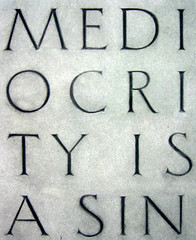State Dept Continues to Fail at Contractor Oversight
by Gary Therkildsen*, 10/26/2009

The contracting boondoggle that is the U.S. Embassy in Baghdad, Iraq came into full focus last week with the State Department's release of an Inspector General's audit of the compound. We already knew that construction of the fortress-like embassy, which is the largest on the planet and ten times bigger than any other US embassy, was riddled with the big WF&B (waste, fraud and abuse), but the sheer scale of corruption and ineptitude detailed in the report brings back into question the State Department's ability to oversee contractors.
The report found numerous flaws with First Kuwaiti Trading and Contracting's (FKTC) handling of the $470 million worth of no-bid contracts it received to construct the embassy. In fact, the IG report urges State to take back $132 million from FKTC due to issues such as the following:
- $1.7 million to repair the New Embassy Compound (NEC) wall surfaces and concrete walkways that were improperly installed and are now subject to cracking.
- $4.4 million to repair the NEC’s power distribution system because First Kuwaiti substituted a less reliable system, including using nonstandard wiring.
- $4.6 million to correct fire protection systems because the walls in the housing units were not compliant with code and fire protection water mains were improperly constructed.
- $4.6 million to repair safe areas, which are vital to protecting staff in emergency situations but which were not constructed according to contract specifications.
- $14 million to install seismic bracing, which is required for safeguarding fire protection lines and other critical mechanical systems that First Kuwaiti had not completed.
How did FKTC get away with these egregious violations? Well, it turns out that the Emergency Project Coordination Office (EPCO), the special group created by the State Department's Bureau of Overseas Buildings Operations to oversee construction of the facility, was not doing its job. According to the report, the individual in charge of the group simply did not "enforce contract provisions, most notably design and construction requirements, which resulted in many of the construction deficiencies listed."
And we've seen this inability from State to oversee contractors before, most recently in the debacle that were the ArmorGroup frat party incidents at the U.S. Embassy guard camp in Kabul, Afghanistan. Most disturbing is State's clumsily defensive and, yet somehow, blasé attitude toward dealing with these matters.
In the same vein as Under Secretary of State Patrick Kennedy assuring the Commission on Wartime Contracting at a hearing in September that he somehow took full responsibility for the incidents in Kabul and yet no consequences came of it, State is now expressing doubt about whether it would be worth their time and effort to recover the suggested sum from FKTC. Are you kidding me? Look, I know Secretary Clinton wants to encourage cheating, corrupt contractors industry in a down economy, but this is beyond the pale.
This may sound a bit commonsensical, but if there are no consequences for contractor misconduct it doesn't matter how many reforms you pass or regulations you create because the misconduct will continue. While $132 million might be a paltry sum compared to the hundreds of billions of dollars we've spent on reconstruction in the Middle East, it's worth it to go after the money just to teach FKTC a lesson and send a message to other contractors who might also try to rip off Uncle Sam.
Image by Flickr user thost used under a Creative Commons license.



